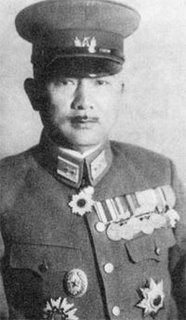Kuribayshi.

This is coolbert:
"Of all of our adversaries in the Pacific, Kuribayashi was the most redoubtable." - Holland Smith, commander of American forces in Battle of Iwo Jima.
"Grateful to his Majesty for giving me
A chance to fight on the foremost front.
I depart with buoyant heart,
Filled with joy and exultation"
- - Rear Admiral Toshinosuka Ichimaru - - Japanese defender, Iwo Jima.
"Grateful to his Majesty for giving me
A chance to fight on the foremost front.
I depart with buoyant heart,
Filled with joy and exultation"
- - Rear Admiral Toshinosuka Ichimaru - - Japanese defender, Iwo Jima.
I looked over that web site and the linked web site that supposedly made comparisons between Iwo Jima and Iraq and found them to be lacking. Did not make good persuasive arguments, if the arguments were even made at all!
http://www.donaldsensing.com/2005/03/iwo-jima-and-iraq-how-similar_01.html
http://vodkapundit.com/archives/007531.php
From the latter site, I did read this comment that did catch my eye instantly:
"If Iwo was that worthless, why did the Japanese put so much effort into its defense?"
"Military value aside, Iwo Jima was the first actual Japanese territory the US took."
My instantaneous intuitive answer would be that the defenders of Iwo wanted to go down in a blaze of glory, killing as many Americans as possible.
The Japanese were able to surmise that an American attack on Iwo would take place. The Japanese at that point also realized that a defense of Iwo would not result in victory as the term victory is generally understood. The Americans would capture the island, but if properly defended by the Japanese, could only do so at great cost [it was a great cost too!!]. By 1945 the Japanese were considering a NEGOTIATED PEACE, not surrender. Excessive American casualties, so went the Japanese thinking, might prompt the U.S. government to also seek a NEGOTIATED end to the war.
The Japanese DID put a lot of effort, manpower, armaments, etc., into the defense of Iwo:
* Extensive and very elaborate bunkers, tunnels, and underground fortifications.
"To this end, mining engineers were dispatched from Japan to draw blueprints for projected underground fortifications that would consist of elaborate tunnels at varying levels to assure good ventilation and minimize the effect of bombs or shells exploding near the entrances or exits."
"their defenses became virtually immune to air or naval bombardment."
Virtually immune!!
* 361 artillery pieces of 75 mm or larger caliber
* a dozen 320 mm mortars.
* 65 medium (150 mm) and light (81 mm) mortars,
* 33 naval guns 80 mm or larger, and
* 94 anti-aircraft guns 75 mm or larger.
* more than two hundred 20 mm and 25 mm antiaircraft guns.
* sixty-nine 37 mm and 47 mm antitank guns.
* a variety of rockets.
"an eight-inch type that weighed 90 kg and could travel 2–3 km, to a giant 250 kg projectile that had a range of more than 7 km. Altogether, 70 rocket guns and their crews reached Iwo Jima."
* 22 tanks.
"the tanks were deployed in static positions. They were either buried or their turrets were dismounted and so skillfully emplaced in the rocky ground that they were practically invisible from the air or from the ground."
The Japanese garrison on Iwo numbered about 22,000 men. For a garrison this size, that amount of firepower available from artillery, tank, and rocket fire is just amazing!!
[and all located in such a small place too!!]
The Japanese commander Kuribayashi evidently possessed superior leadership abilities and was not out of touch with the reality of his position. Victory was not possible. He WAS going to be defeated. This he knew. It was only a matter of his taking as many Americans with him as he could. This was apparent.
"General Kuribayashi was more determined than ever to exact the heaviest possible price for Iwo Jima when the invaders came. Without naval and air support, it was a foregone conclusion that Iwo could not hold out indefinitely against an invader possessing both naval and air supremacy."
"There were two things of which Kuribayashi was certain:
* "that Iwo Jima would eventually fall to the United States and that he and his garrison would all perish."
* "General Kuribayashi had studied carefully other US assaults and had determined that he would not seriously contest the beach landings."
"Kuribayashi stressed once again that he planned to conduct an elastic defense designed to wear down the invasion force."
Kuribayashi did not intend to contest the landings of the Marines. He would allow them to land, and then attack with all he had. That is what he did.
This is interesting:
"Tokyo asked [the] Nazi German General Staff's opinion. Germany replied that waterfront repulse was unfeasible under overwhelming American shelling and bombings according to German experience."
The plan of Kuribayshi was adopted and put into good use causing very heavy American casualties on Iwo.
The island OF ITSELF was not vital to the Japanese either. But did allow them an opportunity to kill a lot of U.S. Marines, which they did.
coolbert.

0 Comments:
Post a Comment
Subscribe to Post Comments [Atom]
<< Home